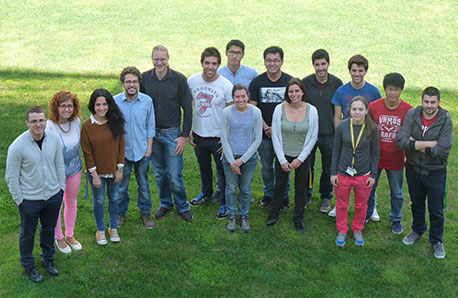Martín
Research group

Abstract
The major goal in the Martin group is to provide solutions to relevant and challenging synthetic problems from the scientific and industrial standpoint, without losing sight its environmental impact. In order to meet these challenges, the group is mainly focused on the metal-catalyzed, selective activation of relatively inert entities of great significance, such as CO2, C-H bonds, C-C bonds and C-O bonds, as these motifs rank amongst the most widespread and fundamental linkages in organic chemistry. We are also interesting on the design and implementation of metal-catalyzed domino reactions since a high degree of molecular complexity can be achieved in a one-step, hence allowing a rapid access to key backbones occurring in many natural products.
Topics addressed
- Ni-catalyzed reductive cleavage of C-O Bonds
- Metal-catalyzed C-H bond-functionalization
- Ni-catalyzed CO2 Activation
Articles
“Ligand-controlled regiodivergent Ni-catalyzed reductive carboxylation of allyl esters with CO2”
J. Am. Chem. Soc. 2014, 136, 17702-17705
Moragas, T. ; Cornella, J. ; Martin, R.
“Metal-catalyzed activation of ethers via C-O bond-cleavage: a new strategy for molecular diversity”
Chem. Soc. Rev. 2014, 43, 8081-8097
Cornella, J.; Zarate, C.; Martin, R.
“Mild ArI-catalyzed C(sp2)-H or C(sp3)-H functionalization/C-O formation: an intriguing catalyst-controlled selectivity switch”
Angew. Chem. Int. Ed. 2014, 53, 11084-11087
Wang, X.; Gallardo-Donaire, J.; Martin, R.
“Ni-catalyzed reductive cleavage of methyl 3-methoxy-2-naphthoate”
Org. Synth. 2014, 91, 260-272
Cornella, J.; Zarate, C.; Martin, R.
“Ni-catalyzed carboxylation of unactivated primary alkyl bromides and sulfonates with CO2”
J. Am. Chem. Soc. 2014, 136, 11212-11215
Liu, Y.; Cornella, J.; Martin, R.
“Metal-catalyzed reductive coupling reactions of organic halides with carbonyl-type compounds”
Chem. Eur. J. 2014, 20, 8242-8258
Moragas, T.; Correa, A.; Martin, R.
“Ni-catalyzed direct reductive amidation via C-O bond-cleavage”
J. Am. Chem. Soc. 2014, 136, 7253-7256
Correa, A.; Martin, R.
“A mild Ni/Cu-catalyzed silylation via C-O cleavage”
J. Am. Chem. Soc. 2014, 136, 2236-2239
Zarate, C.; Martin, R.
“Ni-catalyzed carboxylation of C(sp2)- and C(sp3)-O bonds with CO2”
J. Am. Chem. Soc. 2014, 136, 1062-1069
Correa, A.; León, T.; Martin, R.